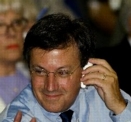|
Thomas S. Blanton is Director of the National Security Archive at George Washington University in Washington D.C. The Archive won U.S. journalism's George Polk Award in April 2000 for "piercing self-serving veils of government secrecy, guiding journalists in search for the truth, and informing us all." The Los Angeles Times (16 January 2001) described the Archive as "the world's largest nongovernmental library of declassified documents."
The National Security Archive has organized numerous international conferences bringing together historic personalities to confront, explain and analyze the decisions they have made in international crises such as the Vietnam War and the Cuban Missile Crisis.
The Archive is the repository of the largest collection of declassified intelligence imagery from the U.S. and other nations.
Blanton served as the Archive's first Director of Planning & Research beginning in 1986, became Deputy Director in 1989, and Executive Director in 1992. He filed his first Freedom of Information Act request in 1976 as a weekly newspaper reporter in Minnesota; and among many hundreds subsequently, he filed the FOIA request and subsequent lawsuit (with Public Citizen Litigation Group) that forced the release of Oliver North's Iran-contra diaries in 1990.
His books include White House E-Mail: The Top Secret Computer Messages the Reagan-Bush White House Tried to Destroy (New York: The New Press, 1995), which The New York Times described as "a stream of insights into past American policy, spiced with depictions of White House officials in poses they would never adopt for a formal portrait." He co-authored The Chronology (New York: Warner Books, 1987) on the Iran-contra affair, and served as a contributing author to three editions of the ACLU's authoritative guide, Litigation Under the Federal Open Government Laws, and to the Brookings Institution study Atomic Audit: The Costs and Consequences of U.S. Nuclear Weapons Since 1940 (Washington, D.C.: Brookings, 1998).
His articles have appeared in The International Herald-Tribune, The New York Times, The Washington Post, Los Angeles Times, The Wall Street Journal, The Boston Globe, Slate, the Wilson Quarterly, and many other publications. A graduate of Harvard University, where he was an editor of the independent university daily newspaper The Harvard Crimson, he won Harvard's 1979 Newcomen Prize in history. He also received the 1996 American Library Association James Madison Award Citation for "defending the public's right to know."
He is a founding editorial board member of freedominfo.org, the virtual network of international freedom of information advocates; and serves on the editorial board of H-DIPLO, the diplomatic history electronic bulletin board, and on the board of directors of the Bulletin of the Atomic Scientists, among other professional activities.
|

